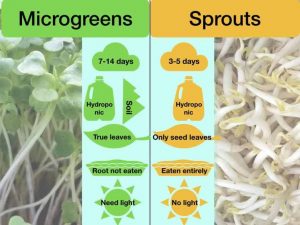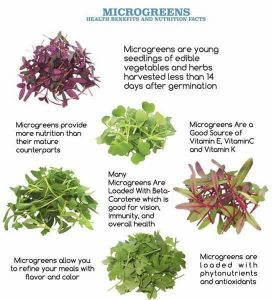SPROUT OR MICROGREEN?
Do you know the difference? Both are nutrient rich and used on various menu item foods. Sprouts typically are seeds, germinated in water only, for 3 to 5 days. They are not “harvested” but rather packaged as is. The consumer eats the seed and root, sometimes with a small green shoot.
Microgreens are seeds germinated and grown in soil (or other fiber medium), for 8 to 14 days in a well-ventilated area, CUT to harvest, leaving the seed and root behind. Usually packaged in clamshell containers, the consumer eats the shoot, rather than the seed/root. Personal opinion. we think Microgreens taste much more flavorful.
Here is a helpful at-a-glance image. This and LOTS more information can be found on this great site Microveggy.com
NUTRITION DATA
Sunflowers
- Quick growing, crunchy texture, nutty flavor
- The generic name, Helianthus, is derived from Greek ‘helios’ meaning the sun,
and ‘anthos’ meaning a flower. - Nutritional Data: Sunflowers are made of 24% to 30% protein with 8 essential amino acids present. Vitamins: A, B1, B2, B3, B5, B6, B12, B15, C, D, E, F, H, K, Choline, Folic Acid, Inositol, PABA, Calcium, Cobalt, Copper, Iodine, Iron, Magnesium, Manganese, Phosphorous, Potassium, Selenium, Silicon and Zinc.
- Healthy living: Sunflowers support good health with anti-inflammatory, anti-fatigue, anti-microbial and antioxidant properties.
- Culinary Uses: Blend into pesto, salad mixes, smoothies, garden salsa or top burgers, pitas, steaks and vegetable sides.
Source: http://sproutingseedsoflove.com/plants/living-whole-foods
Radish
- Quick growing, tender texture, spicy peppery flavor. Daikon, most popular radish, is Japanese for “big root”
- Nutritional Data: Radish are an excellent source of folate, Vitamin B6, A, C, E. Calcium, Magnesium, Phosphorus and Potassium
- Healthy living: Help in building healthy skin and cardiovascular systems. Natural cleansing agent for digestive system, helps fight colds & sore throats. High in vitamin C, phosphorus and zinc.
- Culinary Uses: Radish is not just for salads any more. Top fajitas, omelets, pizza, potato salad, seafood, burgers and makes a zippy pesto Source: http://www.healwithfood.org/health-benefits/radish-sprouts-nutrition
Sweet Pea Shoots
- Shoots and curly tendrils, delicate texture, sweet taste
- Fabaceae – third largest plant family, known as the bean (Legumes) family, with more than eighteen thousand species.
- Nutritional Data: Pea shoots are rich in Vitamin A, C, K and folic acid, and a good source of beta carotene.
- Healthy living: Pea shoots are a great source of three chemoprotective agents: folate, antioxidants and carotene. Pea Shoots are dense with antioxidants and phytonutrients needed to support the body’s complex inflammation system.
- Culinary Uses: Pea shoots add a sweet, crunchy flavor and visual fun to any dish. Wraps, top salads, Add to stir fry. Exceptional in Asian dishes.
Source: https://www.healthdiaries.com/eatthis/6-health-benefits-of-pea-shoots
- Mustard Microgreens – Contain powerful glucoinolates, antioxidants linked to decreased cancer risk, as well as enhancing the immune system. High in vitamins A, K, C and E
- Cabbage Microgreens – Helps control heart rate and blood pressure. High in vitamins A, K and C. Contains anthocyanins proven to have anti-carcinogenic properties
- Broccoli Microgreens – Contains sulforaphane, which alleviates inflammation and helps skin damages from the sun. High in vitamins A and C
- Kale Microgreens – Strengthens the body and a great anti-aging tool. High levels of vitamin A, K and C, high in fiber, iron, copper and manganese.
Arugula
- Unique, serrated leaf shape with signature peppery flavor
- Eruca sativa, from the Brassicaceae family
- Nutritional Data: Rich in calcium, good source of vitamin B9, C, K, B5, iron, magnesium, selenium, antioxidants and glucosinolates. Helps cleanse & neutralize acidic waste.
- Healthy living: Arugula’s calcium richness, helps build bone and teeth health, muscular contraction, blood clotting and aids in increasing energy.
- Culinary Uses: Originally from Italy and France, microgreens and full grown leaves are used in hot and cold dishes. Often eaten in salads, pairs well with goat cheese and can substitute for basil in pesto. Combined with lemon, Arugula brings out the salty
flavors in seafood. Top pizza, season soups, garnish hors d’oeuvres.
Source: http://www.fondationlouisbonduelle.org/en/vegetable/arugula/
A few sites on nutritional data you may like to jump over to for more in depth reading.
- Healthline is a good, general information site. https://www.healthline.com/nutrition/microgreens
- General information – beware, lots of ads on the page. https://www.healwithfood.org/health-benefits/microgreens-nutrition.php
- Medical News Today 2017 article. General information. https://www.medicalnewstoday.com/articles/316075.php
- Growing your own microgreens – a good resource of well-researched information. https://www.growyourmicrogreens.com/guides/microgreens-health-benefits
- USDA study on microgreens 2014 https://agresearchmag.ars.usda.gov/2014/jan/greensStudy done in 2012 by the University of Maryland. https://agnr.umd.edu/news/mighty-microgreens
| Microgreen | *Flavor Highlights | Pairing |
|---|---|---|
| Arugula | Dark green leaves with spicy, peppery flavor | Salads, meat entrees, pitas, pasta, cheeses, seafood, top off pizza and accent appetizers |
| Broccoli | Mild, sweet, distinctive broccoli flavor | Salads, wraps, pitas, smoothies, vegetable stir fry |
| Classy Classic (The Greensted custom blend) |
Mix of mild flavored brassicas, including broccoli, kale, cabbages and mizuna. | Salads, sandwiches, burgers, pitas, eggs |
| Cressida / Cress | Fancy, three-lobed leaves with intense pepper flavor | Salads, pitas, seafood |
| Kale, Red Russian / Blue Dwarf | Dark green, serrated leaves with light purple edges, mild spiciness. | Salads, smoothies, vegetable sides, pesto |
| Kohlrabi | Purple stems, dark green leaves with purple tint, mild cabbage flavor | Asian dishes, pesto, soups especially beef/veg based |
| Mizuna (mild mustard) | Unique Japanese mustard green with fancy, toothed leaves, mild flavor | Stir fry, vegetable sides, sandwiches |
| Mustard, Red Giant | Green leaves with red veins and spicy flavor | Blended with other microgreens, used for salads, sandwiches, fajitas and tacos |
| Pea Shoots | Green leaves, round, on a firm stem; sweet, young pea flavor | Stir fry, Asian dishes, salads, pesto, egg dishes, sandwiches, wraps |
| Radish | Daikon: Spicy. Red Arrow: Medium spice. Sparkler: Mild | Everything! Salads, sandwiches, entrees, side dishes, potatoes, pizza, wraps, eggs |
| Sunflower Shoots | Oblong, thick leaves, on a round stem; mild, nutty flavor. | Smoothies, quinoa dishes, salads, grilled/broiled meat entrees i.e. beef. |
| Zesty Mix (The Greensted custom blend) |
Intense, flavorful blend of Arugula, red and green mustards, collards | Salads, fajitas, pitas, sandwiches, vegetable sides, especially suited for Salmon
*Source: www.johnnyseeds.com
|
POLICIES AND PACKAGING
We are a southeast Minnesota urban farm committed to safety, quality and environmental responsibility.- We use 100% post-consumer recycled packaging materials which meet all regulatory standards.
- All our plants are grown with fresh soil in a well ventilated growing environment.
- We take care to avoid all contact with common allergens such as gluten and dairy.
- Produce is harvested, washed and packaged with the greatest of care and should be ready to eat, however a light rinse is recommended.
- Keep your greens refrigerated and lightly moist to maintain freshness. We recommend storing packages upside-down, allowing condensation to gather in the moisture-control paper toweling.
The Greensted is committed to the highest standards for food safety, food quality, and environmental responsibility.
ALLERGEN INFORMATION
All of our Microgreens are free of common allergens. Plants are grown in fresh, sterile soil, in a well-ventilated growing environment, and do not come into contact with any products containing gluten, nuts or dairy. Microgreens are harvested and packaged with the greatest of care to provide our customers with high-quality, food safe products. It is recommended to lightly rinse Microgreens in clear, cool water prior to consumption.


